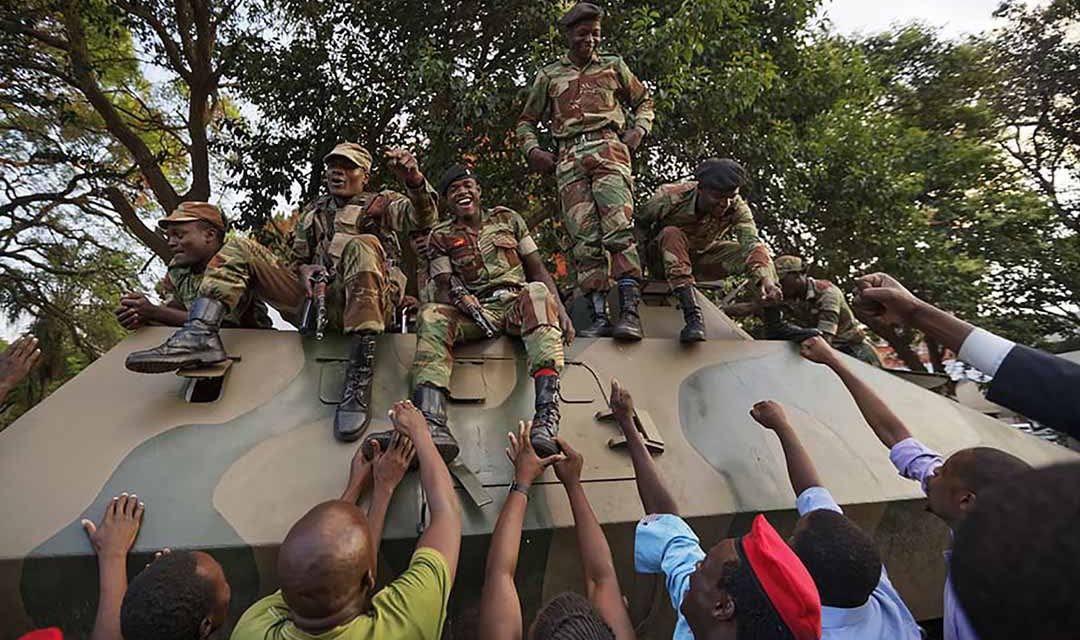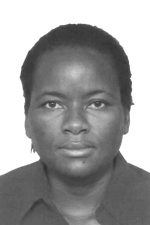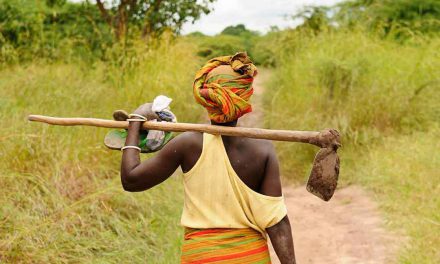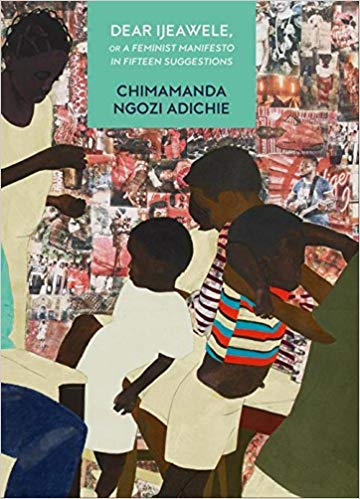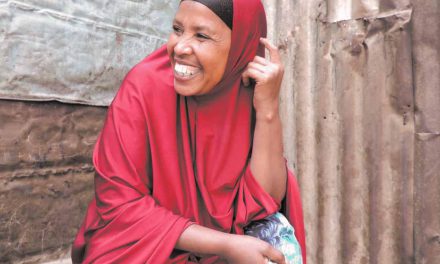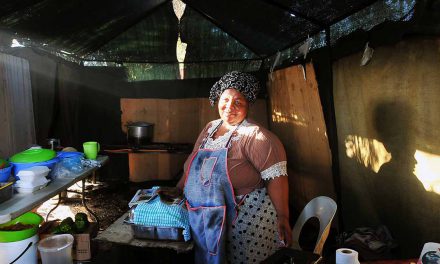The ruling party’s focus on “struggle credentials” and militarised politics suggests that more women in government is about numbers, not equality
In November 2017, Zimbabwe saw a transfer of power from former president Robert Mugabe to Emmerson Mnangagwa, which most Zimbabweans think of as a military coup. During the harmonised elections (presidential, parliamentary and council elections) on 30 July, 2018, some 23 candidates campaigned for the presidency, four of them women. Compared to past elections, this was a large number.
Meanwhile, some 210 parliamentary seats were contested, of which women won 95. In the Senate, women now occupy 36 out of 80 seats and 45% of seats in both houses – just below the 50% ideal set by the SADC Protocol on Gender and Development of 2008. Subsequently, a cabinet of 22 was appointed, of whom six were women. Two of them were appointed directly by the new president, rather than selected by political parties.
For the first time since independence, a woman is in charge of the defence and war veterans’ portfolio. Some five women were appointed as ministers of state out of a total of nine, though without specific portfolios. People in these positions usually work in the president’s office in an advisory or monitoring capacity. The women were chosen among loyal ruling party cadres. Furthermore, the speaker of the lower house is a woman. Commentators have been quick to cite these figures as an improvement in women’s political leadership on past governments.
The situation outlined above is indeed an improvement in terms of numbers. But does this mean that the representation of women’s interests has improved? Head counts such as quota systems are relatively easy to legislate and assess for compliance, but they do not always translate to a substantive representation of women’s gender interests. Substantive representation, as political scientist Cecilia Josefsson put it in a 2014 article, would ideally be both critical and transformative of gendered discrimination and domination of women and subordinate men, but it has proved elusive in Zimbabwe.
This has to do with the criteria used to select women for political leadership roles, which are based on the political interests and outlook of the country’s ruling elite. Under ZANU-PF, Zimbabwe can be described as dominated by a “triumphant hegemonic militarised masculinity,” according to development and gender studies researcher Professor Jane Parpart. Under this system, “struggle credentials” have been instrumental in determining access to public office – mostly for a shrinking clique of men.
The party’s preoccupation with “struggle credentials” as the defining criterion for leadership in the party and government has narrowed the pool of candidates in ways that do not address the needs of the majority. Political leadership has become an entitlement of those with proven struggle credentials, with impunity as a perk of political office, according to Parpart. Senior political figures do not retire, even though members of the civil service are required by law to retire between 60 and 65 years of age. Furthermore, struggle credentials have allowed senior political figures preferential access to resources such as land, credit, overseas scholarships for children, and healthcare abroad. Struggle credentials have also fostered a lack of accountability and opacity in public life that has enabled wanton corruption and silenced critics.
Dissenters, including members of opposition parties, trade unions calling for better working conditions and informal-sector workers who call for leaders’ accountability to citizens’ demands, are vilified as “traitors” and “puppets of imperialists”. The military has also been used to quell dissent, as with the 1998 food riots, the farm occupations and “fast-track” land reforms in 2000, the “clearing” of informal-sector workers in 2005, the campaign against artisanal diamond miners in Marange between 2006 and 2008, and “policing” activities aimed at members of the opposition in the run-up to the 2008 elections. These military activities have resulted in human rights violations. As Parpart and other authors have pointed out, use of the military in this way effectively insulates politicians from the demands of ordinary people.
Recent studies by researchers Jeremiah I. Williamson and David Towriss have shown that Zimbabwe’s society has been extensively militarised since the late 1990s. After the July, 2018 elections, seven people died after being shot, allegedly by the army, during protests in Harare over delays in election results. A commission of inquiry has since been established. Earlier in April 2018, over 4,000 nurses were threatened with summary dismissal after they went on strike to demand better overtime allowances. Vice President Constantine Chiwenga – a former general and key player in the November 2017 coup – argued that the strike endangered patients.
All of this has implications for the question of women’s substantive representation in Zimbabwe. When “improvements” in women’s political representation are refracted through the militarised and masculine politics of the ruling party, women politicians are reduced to “female representatives” of parties instead of “representatives of women”, as Josefsson puts it. This does not accommodate critical engagement on gendered concerns of women – or those of men for that matter. Calls for better working conditions have been made since 2009, when the multi-currency policy was adopted. The need for positive change in this area was probably one reason why ordinary people were sympathetic to the military takeover.
The militarisation of Zimbabwe, which considerably predates the coup, seems to have erased downward accountability, as the focus on struggle credentials has generated a need to comply with the authoritarian ethos of the ruling party and with top-down militaristic structures. The obsession with struggle credentials has created a gendered and generational hierarchy – a pecking order that ranks those with struggle and military credentials above all other men and women.
These hierarchies have reproduced the discrimination against women and young people that are typical of patriarchies of neo-patrilineal societies in which women and children are required to play a supportive role, as they were during the struggle. When leaders promote women to higher posts, their benevolence is celebrated. However, the “benevolence” is really a matter of patron-client relations, which have little or nothing to do with substantive improvements for women. As Sita Ranchod-Nilsson argues in a 2006 article, history shows that such “kindness” can vanish in times of crisis.
The fact that a woman is now head of a ministry that manages the military and war veterans could potentially make the military more gender sensitive, but struggle-credential logic undermines this potential. The new minister for defence, Oppah Muchinguri Kashiri, does have struggle credentials; she is an older woman who has earned respect as a loyal cadre of the party and has been in government in different capacities since independence. But she did not condemn previous eras of militarisation.
Women and youth ascend the political ladder via the women’s league and youth wing of the party. Loyal party cadres, who mobilise their respective groups to support male leaders and emphasise struggle credentials of the party and leaders, lead both these institutions. Their interests seem to be about developing their families’ stake in the nationalist discourse or about gaining privileged access to resources for their families; few, if any, of them have demonstrated real abilities in representing women or youth. So the all-pervasive struggle-credential logic ensures that political leadership and neo-patrilineal family relations converge in ways that prevent substantive representation for women and youth.
The outcome of the November coup, then, has been ambiguous for the country. Certainly, it ended Robert Mugabe’s 37 years at the helm. However, it was prompted by the ascendancy to power of Grace Mugabe and her supporters (most without struggle credentials). To that extent, the coup was about preventing subversion of the militarised chain of entitlements to high political office that reflects struggle-credential logic. Indeed, it has resulted in a deepening militarisation of Zimbabwean society as high-ranking male soldiers have left the military to become ministers and senior government officials – thus extending their entitlements and impunity from accountability. Initially popular as it was, the coup has left very little room for consultation with ordinary people.
The need for substantive representation of women is further demonstrated by developments in local council politics. The poor showing of women in local council elections is conspicuous. In 2018, some 1,176 women ran for urban and rural council seats but only 261 (13,3%) were elected nationwide, according to analysis by the Women In Politics Support Unit (Wipsu), a Harare-based NGO. Moreover, since the economic crisis of the early 2000s, women in particular have been increasingly dependent on informal-sector work to survive. The Harare city council is notorious for its harassment of informal-sector workers, leading to injuries and deaths, as well as the confiscation of property – supposedly as evidence for court cases that never seem to take place.
Immediately following the coup, the government was quick to authorise the “decongestion” of Harare by restricting commuter taxis from the city centre, limiting them to designated terminuses on the edges of the central business district. The decision to do so appears to have been made in haste and without preparing the so-called designated sites. The hasty change interfered with the operations of transport businesses. When taxi crews resisted the move, the police used force, killing two people. Following public protests, and in the run up to the harmonised elections, the government had to call off the operation. Then, after the harmonised elections – but before the new councils could meet – soldiers destroyed market stalls. Informal vendors were left stunned and unable to approach a council that had not yet convened its first meeting.
With the cholera outbreak in September 2018, the newly elected, opposition-dominated council seems to have given in to the government’s argument that informal-sector activities were a public health hazard because of a lack of toilets and washing facilities. The cynicism of the operation was all too familiar. The infamous Operation Restore Order (ORO) in 2005 to clear the city centre of informal businesses had also immediately followed elections.
The intermittent outbreaks of cholera and typhoid in Harare since the 1990s point to councils that have not prioritised water and sanitation. In 2018, a new cholera bacterium proved resistant to antibiotics, leaving Harare residents exposed to a weakened healthcare system and shortages of medicine. It can be argued that these failures of public-health management are due to the dominance of male councillors, who appear more interested in accessing their own perks than they are in paying attention to low-income areas saddled with sewerage and water reticulation network problems. Low-income areas have to contend with the consequences of decades of poor management, lack of expertise and shortages of equipment, as well as challenged revenue collection.
In the run-up to the recent harmonised elections, rampant misogyny was evident in the media and across the political divide. For instance, following the death of Morgan Tsvangirai, the founding leader of the Movement for Democratic Change (MDC) in February 2018, the party was plunged into a nasty succession conflict. A female contender for the leadership, trade unionist Thokozani Khupe, was subjected to heckling and name-calling that demeaned her gender and moral standing, according to a 9 October, 2018 report in Zimbabwean news outlet Newsday. Several vocal women members of the opposition were subsequently either marginalised or elbowed out of the line-up of parliamentary candidates. They include gender activist Priscilla Misihairabwi-Mushonga and lawyer Jessie Majome.
As if this was not enough, the head of the election agency, lawyer and high court judge Priscilla Chigumba, attracted criticism for her alleged partiality to the ruling party amid disparaging allegations about her private life. The elections exposed a deep-seated misogyny, often spread through social media, and often implicitly excused as part of a post-coup anxiety about the direction of change. Women in public roles find their private and sexual lives scrutinised in ways that men do not.
Feminists have long argued that states are gendered hierarchies dominated by men. However, campaigns for gender equity and equality have gained ground around the world, exerting pressure on governments to support moves towards a more substantive representation of the interests of women. In Zimbabwe, however, the ruling party’s focus on “struggle credentials” and militarised, masculine politics has rendered the state less amenable to a substantive representation of women, as well as of men without the requisite credentials. The continuing lack of substantive representation of women is not only attributable to pervasive misogyny: it is also part of a wider failure of accountability in Zimbabwean politics that affects other groups.
REKOPANTSWE MATE is a lecturer in the sociology department at the University of Zimbabwe. She holds a PhD in development studies from the International Institute of Social Studies (ISS) in the Netherlands.

